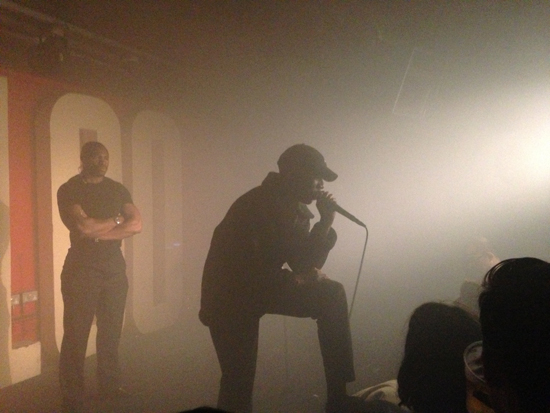"God loves you. Really"
The message wryly scrawled on the 100 Club’s toilet wall, read by a thousand men grasping themselves mid-micturition, has never felt more fittingly inappropriate. Dean Blunt’s nocturnal dub opera released earlier this year documented a mind in introverted reassurance, besotted with regret and unwilling to see clearly, vainly grasping hold of whatever semblance of his manhood there was left. The Redeemer was the sound of an isolated man in his own private, sorry, godless personal hell, but tonight he’s stepping out of the headphones and onstage into the realm of reality.
It’s daunting wondering what to expect from a Dean Blunt gig in the wake of The Redeemer. Since the album’s release earlier this year it’s felt like an instant classic, with repeated listens only strengthening its aura of nocturnal mystique and outsider hooks. Yet how is the experience going to translate to live performance? Much of The Redeemer‘s subtle power was in its masquerade as an exhumed piece of art, documenting the private tribulations of a lost mind, battling for personal redemption-through-art with little more than a handful of samples, VSTs and a twisted, demonic vision. Like the memoir of Dostoevsky’s unnamed narrator in Notes From The Underground, or Henry Darger’s paintings, the initial absence of an audience renders any consumption of the album by the likes of us as seemingly secondary, resigning these pieces to be forever framed by an extension of their own narrative as (either truly or fictitiously) ‘found’ art. How can this become a live performance without fundamentally changing?
The wait for it to start is getting on my nerves. Gradually a smoke machine has turned the room into a sweaty, misty, partially obscured mess of increasingly anxious punters. There’s barely a guy in the room who hasn’t dressed like a Victorian gent or East London party animal, and the necessity of standing still and waiting in humid smoke machine fog isn’t boding well with the moustachioed ones. Unexpectedly the lights cut out, the familiar pitter-patter of rain gets pumped through the speakers, and a shadowy, towering figure in the guise of security stands silhouetted by low-level lights in centre stage.
The tableau is held for ten minutes, smoke stubbornly streaming to the point where one can only see the closest half of the stage, upon which Joanne Robertson (guest on both The Redeemer and Stone Island – the postscript to the former, recorded recently, Blunt claims, in a Moscow hotel room) is patiently waiting guitar-in-hand. A baseball capped Blunt emerges from the mist to wander restlessly around the stage, circling the security figure, until finally the sound rainfall gives way to signature mellotron VST vocal sounds and the jarringly organic strains of a live trumpet player, blasting away at the smoke-obscured end of the stage. Blunt settles behind a mic, head bowed, and the first sign of rhythm via ‘The Pedigree’s familiar stomp slaps me awake after fifteen minutes of murkiness and confusion, and I’m confronted by Blunt’s world-weary croon. The scene is set, and the show begins. This isn’t mere music. This is fucking theatre.
The setlist mashes together The Redeemer and Stone Island into a fittingly mind-melting exorcism of Blunt’s demons. Both thematically and in terms of narrative resemblance across the two song sets, they work as two parts of a larger whole. The dramaturgy and seamless segues of the whole thing render inter-song applause oddly inappropriate. One moment sees Stone Island‘s eighth untitled track played through (which oddly enough hijacks the sounds previously heard on ‘Flaxen’ from The Redeemer), comprising little more than Blunt speak-singing over a tape.
These dour preludes frame the more tangible moments. During the relentless and surreal taiko drum dirge of ‘Demon’, Joanne Robertson’s vocals and the unseen trumpeter thicken the plot while Blunt calmly raves down the mic about his embittered breakup. The continuing synthetic fog caresses every restless movement or subdued sideways look, the players constantly wavering in and out of silhouette. He’s not so much emerging from the parallel universe of The Redeemer and into the real, but rather pulling me out of my truth and into his sorry own.
An unsettled atmosphere falls across the suddenly silent stage as the darkness shifts from semi to total, and the lights once again drop. Strobes periodically begin to flash, and from the silence rises a bone-throttling sub bass tone. The tone hovers and rises and falls, and the strobing accelerates exponentially. My bowels, thighs and joints ache as the subwoofer onslaught grabs me and systematically shuts down my faculty to reason or think. Just as the low frequency throbbing becomes almost unbearable, and the face-melting strobing hits fever pitch, the test tone rises up and up from belly-loosening to ear-splitting. Is this the feeling he wants to impart upon me? The experience is impossible to ignore, like that late night agony one only feels alone, unable to dismiss besides our better judgement.
The sub-bass torture succumbs to The Redeemer‘s title track. A masterfully reconstituted slice of Fleetwood Mac’s ‘Oh Daddy’ loops endlessly. Blunt croons an order to "wake up, wake up", and promptly leaves the stage with security in tow. Now alone, Joanne Robertson begins a guitar solo – an almost lo-fi ‘Purple Rain’ finale. The track dies out, but she keeps going, running right through an electrified version of ‘Imperial Gold’ as an epilogue.
Up the stairs and out on the street all I can see and hear are smoke and alarms. The punters outside instantly try to work out what just happened, ears still ringing from Blunt’s subwoofer abuse. It was unlike any gig I’d seen, but it felt more real than most I’ve experienced before. What do I think? How do I feel? "God loves me?" Really?


